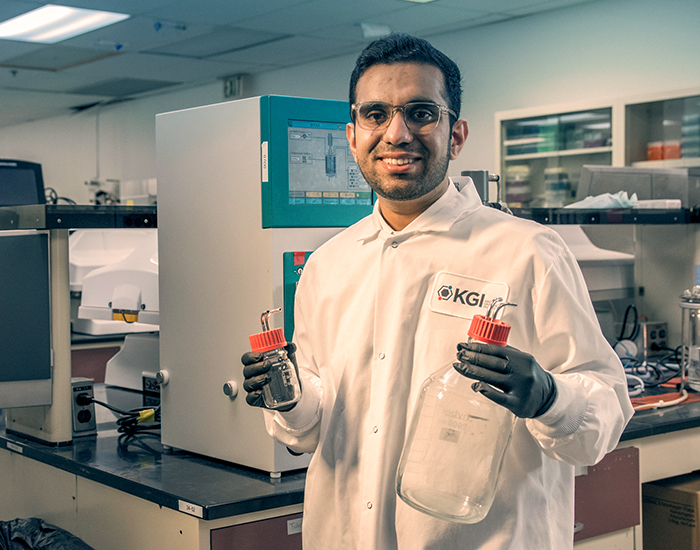Keck Graduate Institute (KGI) has partnered with biotech company ATUM to offer two $50,000 scholarships (each spread out over two years) to students in KGI's Master of Engineering in Biopharmaceutical Processing (MEng) program. The ATUM Scholarship specifically targets underserved students (those identifying as Black, Latinx, or Native American). These groups are traditionally underrepresented in STEM fields in general and the biotech industry specifically. A significant challenge to advancement is demonstrated financial need.
ATUM provides tools and solutions, including gene design and synthesis, protein engineering, and cell line development, to life science researchers. Dr. Oren Beske, ATUM's Amalgamator of Business and Biology, first developed a relationship with KGI around six years ago, when a KGI alum was recruited to work for his previous employer.
Beske has initiated and is spearheading this scholarship on behalf of ATUM as he saw an opportunity to use the company's resources to support underrepresented minorities in biotech.
"I've been in the biotech industry for over 20 years, and it's clear that while things have improved, there certainly remains a lack of diversity in the industry," Beske said.
He believes that this lack of diversity is largely due to inadequate mentorship and financial resources. Many underrepresented groups are not even aware of existing career opportunities within the biotech field. Additionally, the expenses of a biotech education make such careers seem out of reach for many.
"Working two jobs and going to graduate school at the same time is a huge hurdle to many," Beske said. "Over the years, I've built many companies, and it's frustrating not to have an applicant pool of well-educated folks so that I could build a racially diverse workforce to represent who we are as a community, especially here in the Bay Area."
"That's my driving force—to give motivated minority students an educational opportunity they may not have otherwise been able to afford, such as a program like KGI’s MEng. It is one way that we can do our part to bring diversity to the biotech world."
Dr. Sue Behrens, KGI's George B. and Joy Rathmann Professor in Bioprocessing and Director of the Amgen Bioprocessing Center, agrees that many underrepresented students are unaware of existing biotech opportunities. Even if these individuals have obtained a bachelor's degree in biology or another science-related field, such opportunities are still largely unknown to the general public. Additionally, when most people think of engineering, biopharmaceutical engineering—taking potential drug molecules from discovery to commercial application—does not typically come to mind.
"Here at KGI, we began to say, 'How can we help these students who are dedicated and persistent in getting to the next stage?'" Behrens said. "Many students interested in the life sciences or healthcare think that their only option is to become a doctor. Then perhaps they go through pre-med and decide this path isn't for them, but they still want to contribute to healthcare."
Educating such individuals on the opportunities available within biotech shows them how they can pursue healthcare in a way that doesn't require obtaining an MD degree while still making a meaningful contribution to the field and human health and wellness.
Having a more racially diverse workforce will benefit the biotech and biopharmaceutical engineering field as a whole. Because engineering by nature involves problem-solving, including various perspectives is essential for coming up with better solutions.
"When you have the same kind of people working on a problem, you don't get nearly the diversity of thought, and the solutions can be limited," Behrens said. "Thus, bringing together people with different life experiences always provides a more robust problem-solving opportunity."
To qualify for the ATUM scholarship, students must:
- Be entering their first or second year in KGI's MEng program
- Be in good academic standing
- Demonstrate a financial need for support
- Identify as Black, Latinx, or Native American
For questions about the scholarship, students can reach out to KGI's Director of Financial Aid, Maryville Tuzon, at Maryville_Tuzon@kgi.edu.
“We are thrilled to have the ATUM scholarship for underrepresented students who are interested in the MEng program," Tuzon said. "We look forward to assisting students who see their financial resources as a barrier to reaching their career goals.”
For general questions about biotech careers or what it's like to work in the field, Beske is glad to assist. His email is obeske@atum.bio.
Even though biotech and STEM in general still face challenges in diversity, Beske feels optimistic about the possibilities for a more diverse workforce down the road.
"These are challenges that are hundreds of years in the making," Beske said. "So change doesn't happen overnight, but I feel very strongly that it can happen, one student at a time."
